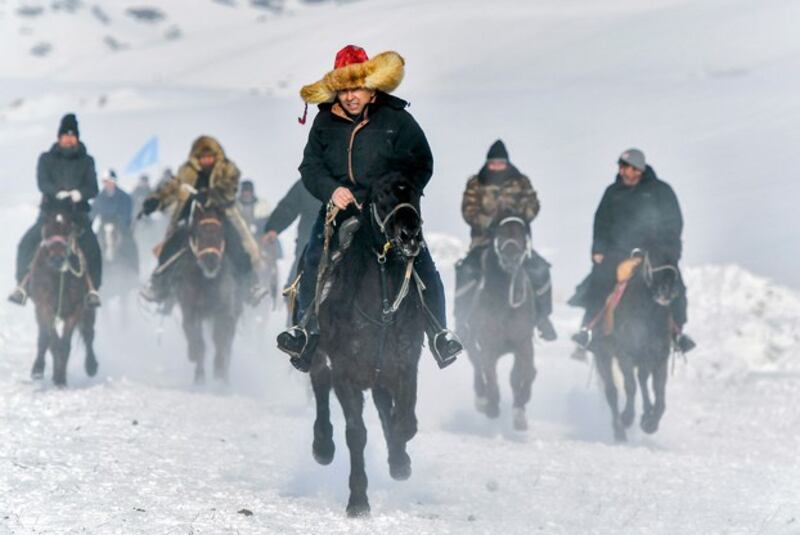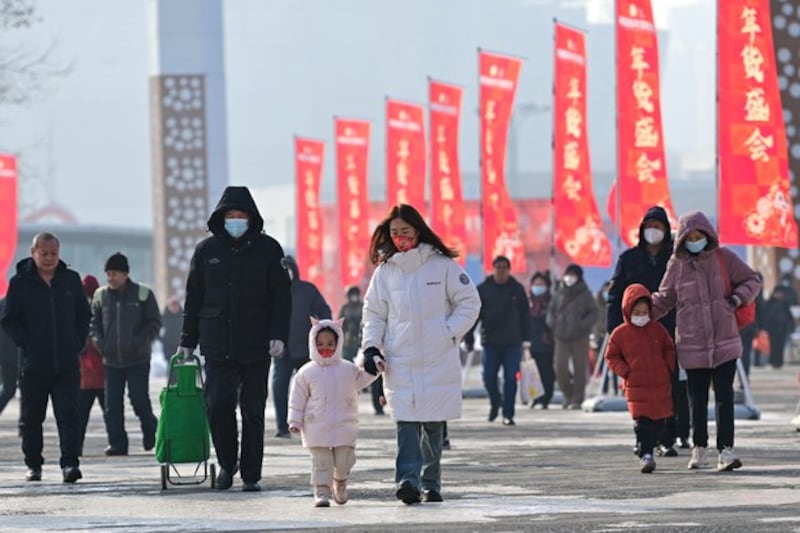Authorities in Xinjiang are forcing Uyghurs to participate in upcoming Lunar New Year celebrations by learning Chinese dances and playing Chinese songs, state-run media reported, as part of the vast region is still recovering from a 7.1-magnitude earthquake.
The Jan. 23 quake that struck a remote northwestern part of Xinjiang killed at least three people and injured five others, and displaced more than 12,400 people in Uchturpan county in Aksu prefecture, next to Kyrgyzstan. The temblor was felt in Almaty, Kazakhstan, and Bishkek, Kyrgyzstan.
While news about the earthquake in China’s state-run media has been limited, there have been numerous reports about how Uyghurs across Xinjiang are observing the Chinese holiday that starts on Feb. 10, with celebrations lasting up to 16 days.
The mostly Muslim Uyghurs are ethnically and culturally distinct from the Han Chinese, the dominant ethnic group in the country, with their own language, food, culture and customs. Traditionally, Uyghurs have not celebrated the Lunar New Year.
And yet this move is the latest attempt by Beijing to portray the false image that Uyghurs embrace Chinese culture and that they live happily together with the Han Chinese ethnic group that dominates most of the rest of the country, activists and experts say.
“This is China's propaganda,” said Rune Steenberg, an anthropologist who focuses on Xinjiang and Uyghurs and who was in Almaty when the quake occurred. “China is attempting to convey that everyone respects Chinese culture, and that’s just propaganda.”
In a related development, Beijing is rolling out a new government policy in neighboring Ili Kazakh Autonomous Prefecture to forge integration among Han Chinese, ethnic Kazakhs and Uyghurs that calls for mixed housing, themed venues and sports and cultural activities that highlight characteristics of Chinese culture that transcends ethnic divisions.
Drum practice
In recent days, Chinese media has published several stories about Uyghurs preparing for the Lunar New Year festivities.
The state-controlled Tengritagh Network reported that celebrations would be held in Aksu, Kashgar, Hotan and other towns. Chinese media also reported that Aksu, Kashgar, Qumul, and Xinjiang’s regional capital Urumqi were immersed in a festive atmosphere.

Chinese authorities are mobilizing Uyghur youths to prepare to participate in Lunar New Year performances, videos on Facebook show. In the videos posted by Zumrat Dawut, a former Uyghur internment camp detainee who was forcibly sterilized, Chinese instructors are leading the youths in rehearsing for drum performances and the traditional Rice Sprout Song dance, a Chinese folk dance popular in northern China.
In Kashgar, Chinese lanterns have been strung up over streets, and houses have been adorned with spring couplets, lines of poetry on red paper pasted vertically on both sides of front doors with a four-character horizontal scroll affixed above the door frame, to express blessings and well wishes for the New Year, Xinjiang Daily reported.
On the day the quake hit, China News Service published two online stories about Uyghurs in two communities in Uchturpan, called Wushi in Chinese, preparing to welcome the Lunar New Year by writing spring couplets and "promoting Chinese culture."
“This event not only promoted the excellent traditional Chinese culture, but also strengthened the communication and interaction between the community and residents, allowing everyone to feel the warmth of the community family and creating a warm and harmonious New Year atmosphere for the community,” the report said.
‘Ethnic genocide’
Imposing Lunar New Year celebrations on Uyghurs is part of what some experts say is an attempt to wipe out Uyghur culture, or “ethnic genocide.”
“Starting from 2017, in the Uyghur region, also known as East Turkistan, there have been ethnic genocide and colonial policies, including mass arrests, forced sterilizations, assigning Chinese cadres to Uyghur families, banning hundreds and thousands of Uyghur books, and rewriting Uyghur history by Chinese historians,” said Leo Maillet, a doctoral student in the Faculty of Oriental Studies at the University of Geneva who specializes in Uyghur culture.
Some Uyghurs are also forced to eat pork during the holiday – anathema to the many Uyghurs who are Muslims because it is forbidden in Islam.
“The Chinese Communist Party’s attempts to force Uyghurs to celebrate Chinese New Year is part of this policy,” he said.
The United States and other Western governments have expressed deep concern about the repression and arbitrary detentions of Uyghurs and other Turkic minorities in Xinjiang, with some declaring that China’s actions amount to genocide and crimes against humanity.

Even prior to 2017, Uyghurs were forced to wear traditional Chinese clothing in schools, companies and cities to celebrate the Lunar New Year, according to Uyghurs who left the region and resettled abroad.
Uyghurs who are required to do these things are unable to express their displeasure, Maillet said.
“The goal of this policy is to Sinicize Uyghur society and replace the local cultures of Uyghur, Kazakh, and Kyrgyz with Chinese ethnic culture,” he said.
Such coercive policies will backfire, Maillet predicted. Rather than embracing Chinese culture, Uyghurs will feel more alienated and harbor resentment towards Chinese authorities, he said.
“If we look at the current crisis facing the Uyghurs, the coercion to consume food made with pork during the Chinese New Year will likely leave a harsh impression on them,” he said.
Translated by RFA Uyghur. Edited by Roseanne Gerin and Malcolm Foster.
